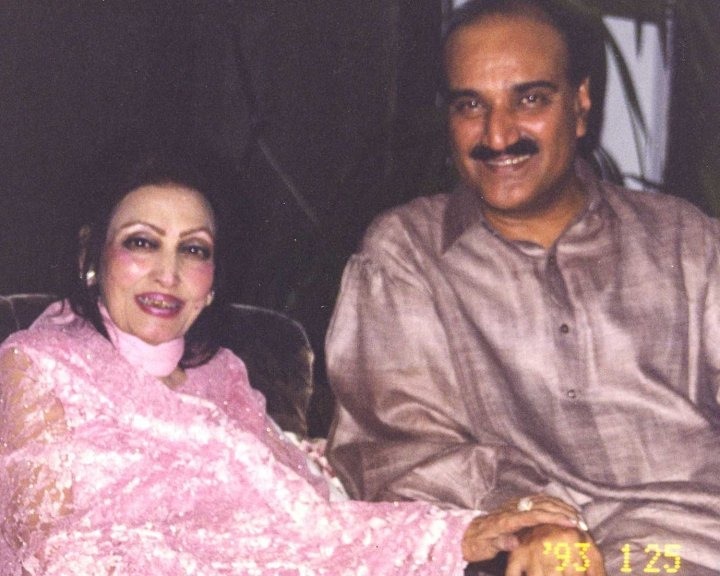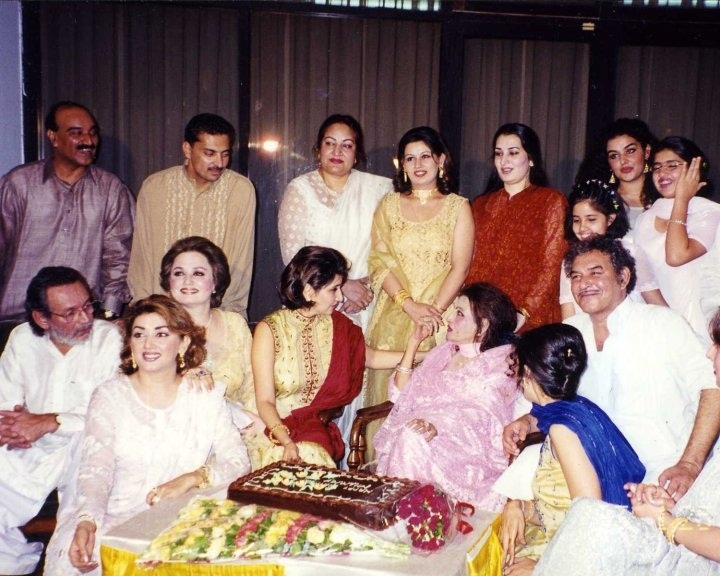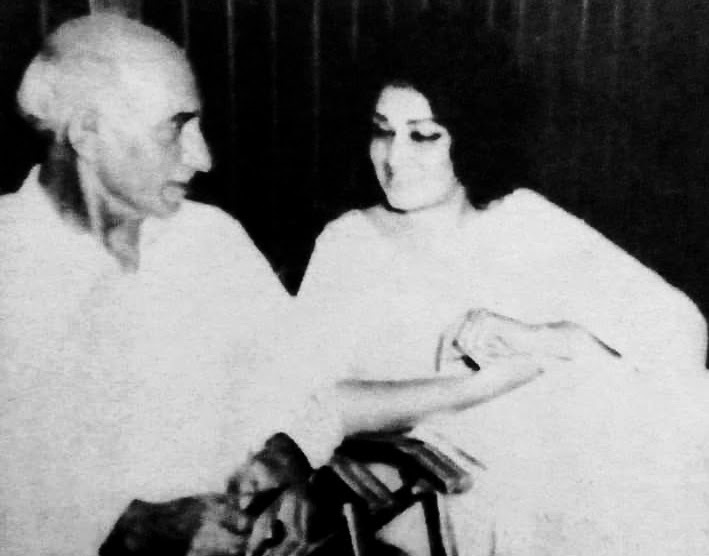Written by: Haroon Shuaib
Posted on: January 24, 2022 |  | 中文
| 中文
Giants of Pakistan's music and poetry in one frame. (L to R) Roshan Ara Begum, Faiz Ahmed Faiz, Madam Noor Jehan and Farida Khanum
For Khawaja Najamul Hassan, award winning producer and director of music shows, dramas and documentaries, his long association with Pakistan Television was an enviable opportunity to work with almost all music greats of the country. When Youlin sat down with him to document his memories of that era and people, who else was to start with but the brightest of them all, Madam Noor Jehan – a vocalist who held the title of ‘Malika-e-Tarannum’ (Queen of Melody) and commanded such an authority on her craft and in her persona that would make any fainthearted weak in the knees.
As fate would have it, one of Najam’s assignments was to produce a weekly music show ‘Tarannum’ with the Queen herself. Najam recalls, ‘As a novice I was obviously anxious. Noor Jehan had never done a show like this on television. I took my assistant Farrukh and reached Noor Jehan’s iconic house. We were seated in a large opulent lounge, almost like a film set, adorned with black and white portraits of Noor Jehan and a grand piano. A set of musicians including Noor Jehan’s tutor were in a corner constantly playing music. Noor Jehan had standing orders to continually play music while she is in the house. In the evening, they would play raga ‘Aiman Kalyan’, and she would wake up to the morning raga ‘Bhairavi’. The purpose of this was so that she could do her ‘riyaaz’ (training) while getting ready for the day, or even while busy with other chores.’
Noor Jehan was a gracious host and Najam and his colleague were served tea and Hors d’ oeuvres. Jingling of her jewelry announced her arrival much before she descended from the towering staircase. ‘She was wearing a white sari and her diamonds made her iridescent. I noticed that she constantly tapped her feet and her anklets tinkled. I hesitantly expressed the reason for our visit. I explained how each episode of ‘Tarannum’ will have four songs: 2 ghazals composed by Ustad Nazar Hussain, whom she agreed was a fine composer, and two of her most iconic Punjabi and Urdu film songs. When these details were agreed, she asked with a hearty laugh in colloquial style, ‘Tormay kee diyo gey?’ (How much will you pay?). I had cleverly brought a contract with me which I immediately presented. She looked at the amount of three thousand per episode and burst out laughing, and said ‘even my lipstick costs more than that’. I explained to her that this was the standard fee offered by Pakistan Television (PTV). At the time, the rate of payment was five hundred rupees per song, even for artists of Farida Khannum and Mehdi Hassan’s caliber, plus five hundred for those artists who had received the President’s Pride of Performance Award. It was perhaps because of a good word about me that Farida Khannum had put in, that Noor Jehan finally agreed to do the Tarannum series under my direction,’ he recalls.

Khawaja Najamul Hassan with Madam Noor Jehan at her residence during her last birthday party on the 21st of September, 2000
Noor Jehan had warned Najam that she would immediately walk out if she did not look good on screen. She took three weeks to lose some weight, and was ready for the first day of recording. ‘Color TV technology had recently been introduced. She did a test take and I could tell she was unhappy. She asked me to gather my crew. ‘Your guru Nabi Ahmed was a third assistant cameraman in my film ‘Chan Vey’. I am Noor Jehan and in case you don’t know me, one of the greatest directors of the subcontinent, Mehboob, launched me as an actress in ‘Anmol Ghari’. I have worked with Faredoon A. Irani, one of the earliest cinematographers of the subcontinent. What kind of lighting have you done for me?’ After that she made us change the lighting. With each change, her beauty shone brighter. Her double chin disappeared, her sari shimmered, and a back light was added to accentuate her signature hairdo. Finally, she asked me to add a small light to reflect in her eyes. The show proved to be a landmark in Pakistan Television’s history. She also taught me a lot about music and ragas,’ Najam narrates fondly.
Najam and Noor Jehan also agreed to invite renowned music director Nisar Bazmi, to recreate one of his memorable songs sung by Noor Jehan ‘Chalo acha huwa tum bhool gaye’. Noor Jehan was keen to invite Bazmi despite the fact that their relationship had become strained as he had been promoting a much younger Runa Laila as her competition. Noor Jehan wanted to bury the hatchet. Najam recalls, ‘Bazmi and I sat on the recording panel and Noor Jehan went into the audio booth. As musicians started playing the track, she immediately stopped. It was a large 35 piece orchestra of musicians. Noor Jehan said that one musician was out of sync. Bazmi was defensive as he would always bring written notations. She pointed to a violinist sitting in a corner and asked us to check his notation sheet. When we checked, she was right, as the violinist made errors while copying his sheet. This was Noor Jehan’s command of her craft.’ Khawaja Najamul Hassan recorded about 80-90 songs of Noor Jehan’s for the ‘Tarannum’ program that ran for six months on PTV.
Noor Jehan always gauged her popularity by the admiration she received from the common people. ‘Film Sher Khan had just released and I went with her to the Sangeet cinema. The film starred the top heroine of her time Anjuman, and Madam Noor Jehan had sung the songs. I still remember that when her song ‘jhanjariya pehna dou’ played, audience started flipping coins towards the screen. Loose change gleamed like rain shower in the blue projection light as her voice filled the dark cinema hall. The cleaning staff at Sangeet collected three sacks full of change that day,’ Najam recollects.

A group picture taken during Madam Noor Jehan's last birthday party on the 21st of September, 2000 at her residence in Karachi.
Sitting (L to R): Akbar Rizvi, Hina Ejaz, Zille Huma, Shazia Ejaz, Madam Noor jehan, Asghar Rizvi, Nazia Ejaz.
Standing (L to R):
Khawaja Najam, Hasan Sardar, Mrs Asghar Rizvi and daughters
Noor Jahan’s following and friendships extended beyond the borders to India, for after all she had started her career in Bombay. She would get together with Lata Mangeshkar and Asha Bhosle whenever they were all in London. Asha Bhosle called up Noor Jahan in 1981 and sought her permission to sing some of the ghazals that she had done for the Taranumprogram. The result was Asha Bhosle’s album Kashish of 1985, but it got little traction. Noor Jahan confided to Khwaja sahib that Ustad Ghulam Muhammad’s training was required to handle the difficult ghazals of Ustad Nazar Hussain . RD Burman, one of the great Indian music composers and Asha Bhosle’s husband, was hospitalized for a heart bypass in London. He told Noor Jahan , when she went to see him, that he had warned Asha that these ghazals were too challenging for her. Burman asked Noor Jahan to tie the rakhi for him(the custom of tying a thread on a man’s wrist as a symbol of adopting him as a brother), and she obliged .
It was many years later in year 2000, that Khwaja sahib got a call from Noor Jehan. She was in Karachi getting treatment for prolonged illness. She said that I am sending you the air ticket and have arranged for you to stay at the Pearl Continental, so come for my birthday, which was on the 21st of September. However, Khwaja sahib was sent officially by the PTV and did not avail her generous offer. “She had a premonition that it was going to be her last birthday. I immediately made plans to leave. We talked about a lot of things when we met. A cleric from the nearby mosque visited her while I was there. He told me that she had asked him to help calculate compensation for all her omitted or forgotten prayers and fasts. She paid 9 million rupees so he could use that to help homeless women as a compensation. She celebrated her birthday surrounded by her children. I returned, but a few days later, on the evening of 27 of Ramadan, which is considered a very sacred and an auspicious night, I got a call that Noor Jehan had passed away. She had put in her will that she should be buried in Karachi as her daughters lived in that city. After a few days I visited Lahore and went to her house with Surraiya Khannum, another famous singer, to refresh my memories. The house was getting demolished as her family had sold it. We saw about 20 women standing at the gate. They had come to check on Noor Jehan’s wellbeing as she had been paying them 20,000 rupees monthly stipend. They didn’t know that Noor Jehan had passed away,” Najam said.
The bond between Najam and Noor Jehan went far beyond that of an artist and a producer. At her last birthday celebration, only her immediate family was present and Khawaja Najamul Hassan was the only outsider.

Madam Noor Jehan and Soofi Ghulam Mustafa Tabasum, Radio Pakistan, Lahore 1965. She sang some of the songs he had composed for the 1965 war.
She was the second woman singer to be awarded the Pride of Performance award, after Roshan Ara Begum, in 1965. The army bestowed on her the Tamgha-i-Imtiaz for her inspiring songs during the 1965 war. She related to Khwaja sahib that when President Ayub asked her where should he pin the medal, she retorted, on my heart. Noor Jehan has left a profound impact, not just with her professional skills and talent as a singer, but also with her multi-faceted and charismatic personality.
You may also like: